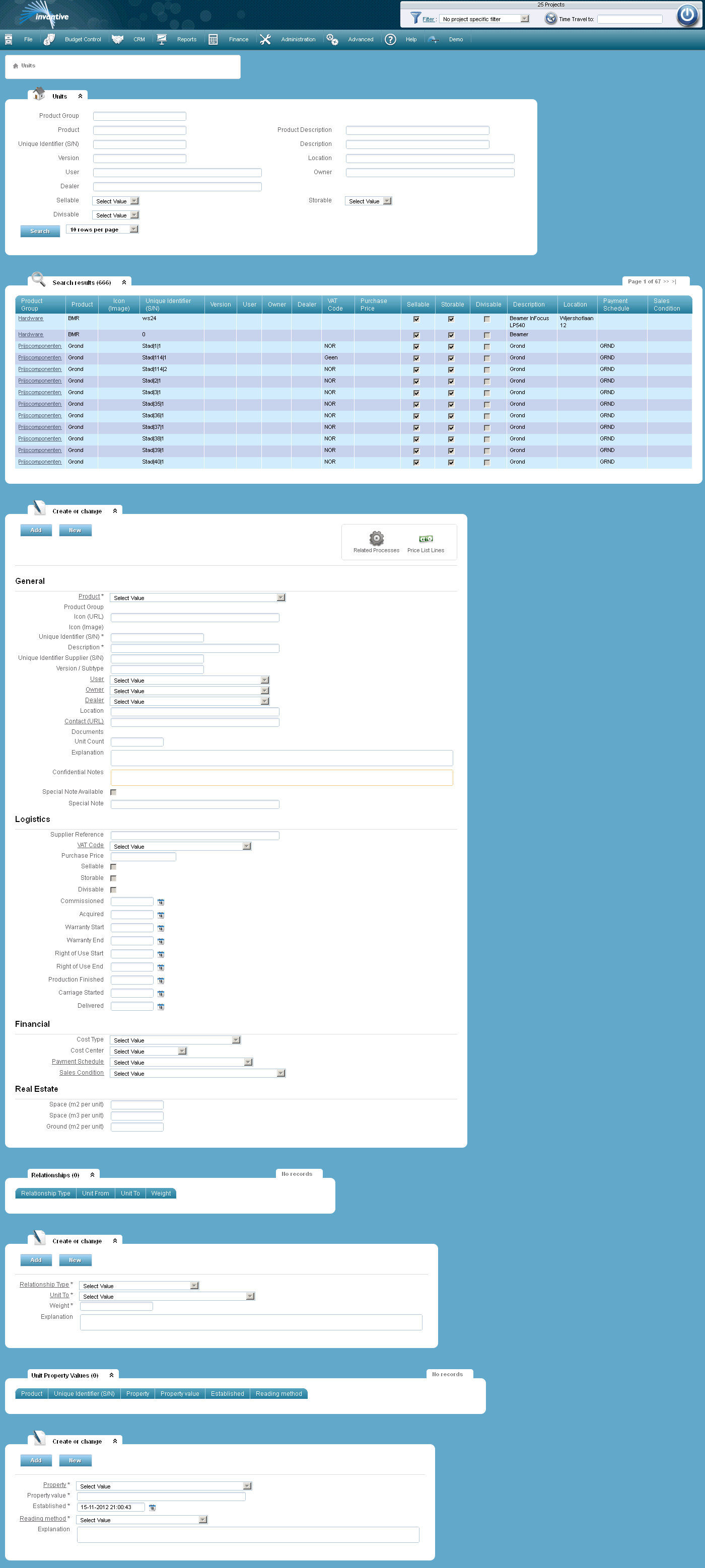In this form you can register and change units. Open Form
Open Form
A unit is an independent object of a certain product. For example, in real estate development this can be an office of the type ‘Gull’, while in the automation it can be a server with a serial number ‘123XBA’ of the type ‘Dell 2950’.
To each product belongs óne unit with the unique identifier ‘0’. This unit can be used for logistic functions if no unique identifier is known. This so-called ‘0-unit’ is created by the system and will automatically be removed if the product is deleted.

The meaning of the entry fields is:
General |
|
Product |
Product, see Products. |
Unique Identifier (SN) |
Unique address, location or serial number of the product. |
Description |
The description of the unit. |
Unique Identifier Supplier (SN) |
The unique address, location or serial number of the unit als known by the supplier. |
Version/Subtype |
Revision of the unit. |
User |
Reference to the organization for which the unit is used, as recorded in Organizations. |
Owner |
Reference to the owner of the unit, as recorded in Organizations. |
Dealer |
Reference to the dealer of the unit, as recorded in Organizations. The dealer is the first contact person for the organization that uses the unit. |
Location |
Geographic location of the unit. |
Contact (URL) |
Information on how you can contact the unit. For example, this could be a webpage or a telephone number. |
Icon (URL) |
Internet address of an image of the unit. |
Documents |
Linked documents, see Linking Documents. |
Units (Quantity) |
Total number of units. |
Explanation |
Possible explanation. |
Confidential Notes |
Confidential information about this unit, for example, such as passwords. |
Special Note Available |
Indicator which shows whether the unit has a valid special note. For example, this could be a determination of theft. |
Special Note |
Special note concerning the unit. An example could be that this is stolen. For example, the note can be shown during data entry to make it easier to detect stolen goods. |
Logistics |
|
Redemption Price |
Purchase price of the unit. |
Sellable |
When checked, it is possible to sell. |
Storeable |
When checked, it is possible to keep in stock. |
Splitable |
When checked, it is possible to divide into separate parts. |
Commissioned |
Date on which the unit is put into operation. |
Acquired |
Date at which the unit is obtained. |
Warranty Start |
Date at which the warranty of the unit starts. |
Warranty End |
Date at which the warranty of the unit ends. |
Right of Use Start |
Date at which the user right of the unit starts. |
Right of Use End |
Date at which the user right of the unit ends. |
Real Estate |
|
Space (m2 per unit) |
Size of the unit in square meters. |
Space (m3 per unit) |
Size of the unit in cubic meters. |
Ground (m2 per unit) |
Size of the land belonging to the unit. |
Relationships |
|
Relationship Type |
Reference to a unit relation type as registered in Unit Relation Type. |
Unit To |
Reference to a unit registered in this screen and positioned at the end of the relationship. |
Weight |
The importance of a relationship. |
Explanation |
Possible explanation. |
Properties |
|
Property |
Reference to a propert as registered in Properties. |
Property value |
Value of the property. |
Established |
Date at which the property was established. |
Reading method |
The way in which the property can be read as registered in Property Determiniation Methods. |
Explanation |
Possible explanation. |
The meaning of the other fields:
Product group |
Reference to a product group as registered in Product Groups. |
Icon (Image) |
Image of the unit. |
 Invantive Estate
Invantive Estate